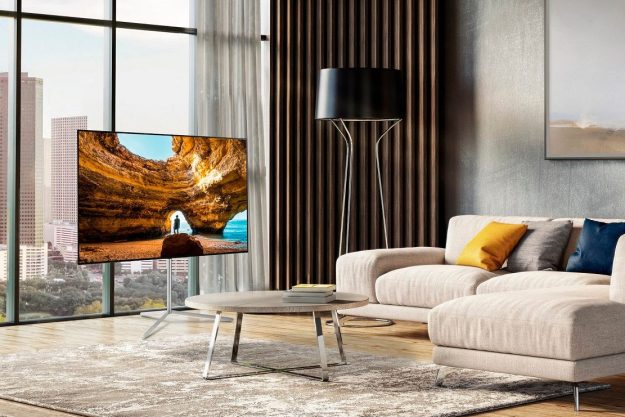WiSA. It’s not exactly a household name, and maybe it never will be. But now that LG has announced that all of its new 2019 flagship OLED and LED TVs will be WiSA-certified, we think you’re going to start hearing a lot more about this wireless audio technology.
WiSA, which stands for Wireless Speaker & Audio, is both a hardware and software specification for delivering 24-bit, 48kHz/96kHz digital audio, wirelessly, with support for up to eight channels, including Dolby Atmos, and DTS X. WiSA, as a technology, has been around since 2013, where it made its debut at CES. We were super impressed by the demo we saw, and even declared WiSA to be the future of your wireless home theater. But since then, WiSA has languished, failing to get a serious toe-hold in the home theater audio market, despite now having the substantial support of brands like Klipsch, Bang & Olufsen, and even LG itself (a division of LG helped create a WiSA USB transmitter sold by Summit Wireless)
This is somewhat surprising, given that consumer interest in wireless audio has fuelled the growth of companies like Sonos, contributed to the success of products like Amazon’s Echo speaker, and prompted the creation of a staggering amount of Bluetooth-based speakers. It’s equally surprising considering WiSA’s key benefit: You can set-up a fully wireless surround system, assembled from your choice of several brand and products, and if you like, you can do it without an AV receiver acting as the middle-man. There’s been an explosion in the number of virtual surround soundbars, which validates WiSA’s central belief — that people want a higher quality of sound than their TVs can deliver, and they want it with the least amount of setup, or modification to their homes.
Maybe it just comes down to marketing. Clearly the AV media’s efforts to raise awareness of WiSA has been insufficient to drive demand. That leaves WiSA, and its member companies, holding the ball in terms of getting the word out, and that’s what makes LG’s announcement so promising.
LG’s top-tier TVs have been a critical success with reviewers (the company’s 2018 C8 OLED TV is Digital Trends’ reigning champ) and have found a place in consumers’ homes around the world. With WiSA support built-in to its latest models, the rest of the WiSA ecosystem gets a much needed shot in the arm, both from an awareness point of view, but also at a more practical level. If you’re equipping a room with an LG TV, and you don’t already own a wired surround system, or a soundbar, you’d be doing yourself a disservice if you didn’t at least consider buying WiSA-compatible transmitter and speakers.
Will 2019 be the year that WiSA finally takes over the home theater? It’s probably too soon to tell, but we’re glad to see technology moving in the right direction.
Editors' Recommendations
- LG’s new M-Series Wireless OLED TVs start at $5,000
- Hands-on with a WiSA wireless home theater system
- Enclave Audio now makes the most powerful Roku TV wireless speakers
- First ‘Tuned by THX’ home theater speakers need no A/V receivers — or wires
- You can now buy Klipsch’s new WiSA-certified wireless home theater speakers



